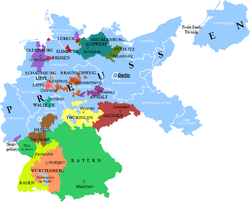

The Free State of Prussia held a series of democratic parliamentary elections to its Landtag between 1919 and 1933. [1] As the largest German state by population and territory, Prussia played a pivotal role in shaping national politics during the Weimar era.
Contents
The democratic system in Prussia was more stable than in other parts of Germany due to the consistent parliamentary majorities held by the Weimar Coalition (SPD, Centre Party, and DDP), which governed throughout the 1920s. From 1919 through 1928, all elections gave a plurality to the SPD.
In 1932 and 1933, the NSDAP (Nazi Party) won pluralities, generally in line with the rest of Germany. [2] [3] The Landtag was formally abolished following the "Law on the Reconstruction of the Reich" of 30 January 1934, which replaced the German federal system with unitary state. [4]